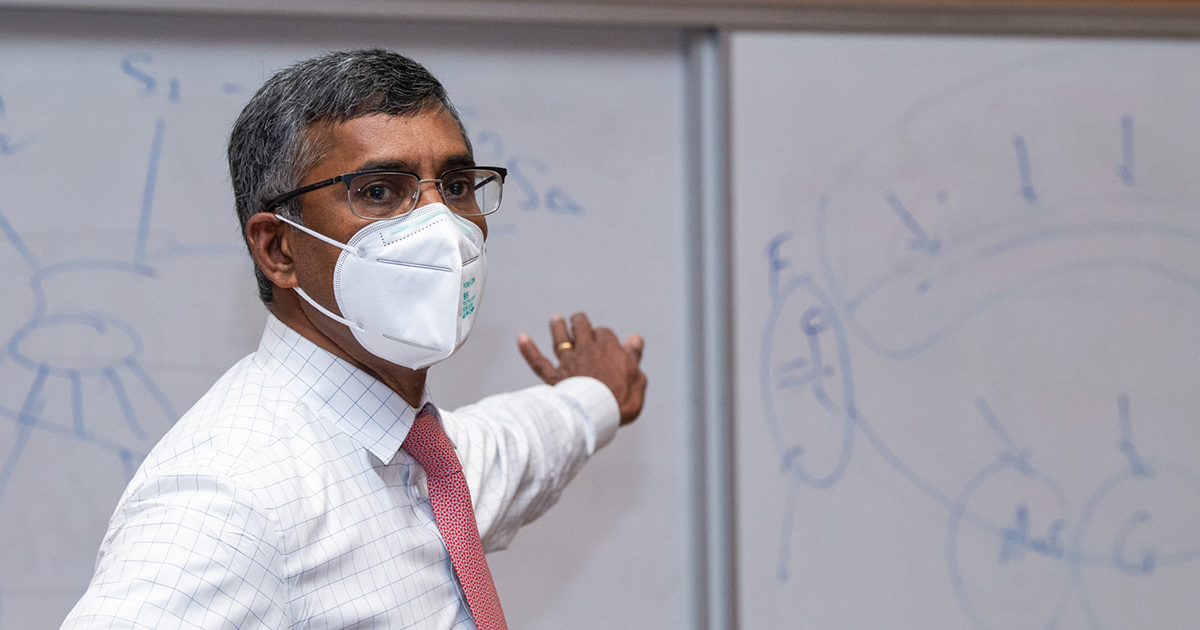
Blockchain and bitcoin often conjure images of far off billionaires and technology companies trying to profit off the “next big thing.” It’s more than that.
In the first-in-a series interactive discussion with EMBA and Flex-MBA students, Maryland Smith Dean Prabhudev Konana explained how blockchain “can creatively destroy the old ways, while offering new ways of doing business with potentially new value done faster, better and cheaper.” The discussion, “Transforming Business Through Blockchain,” was part of a daylong Business Decoded Seminar, in which master’s level students take part in a deep-dive discussion of a highly relevant, emerging business topic.
Fundamentally, blockchain is a cryptographically sealed chain of blocks containing data. What makes blockchain appealing to many companies are the security, verification and required transparency surrounding the blocks. And, once an entry is created, it cannot be modified (immutability) and transaction history can be traced and verified before a block is created through the blockchain.
“There is a lot of hype and a lot of potential behind blockchain,” said Konana. “It has the potential to fundamentally change a lot of areas of business, especially accounting.”
While many people have trouble understanding blockchain, Konana said, the technology needed already exists and it has the power to transform different areas of business – for example, accounting practices such as audit and assurance.
“Right now, it is difficult to ensure all transactions are correct and as humans, we’re likely to miss a lot,” said Konana. “Imagine a system where transactions can be verified in the system everyday without needing to check. This could eliminate the need for audit and assurance practices.”
The implications of blockchain are not limited to companies in the United States. To illustrate the global implications of blockchain, Konana highlighted a large area of potential impact: the supply chain and international money transfers.
“If you can connect farmers to buyers directly, you can eliminate the government controlled intermediaries in (developing) countries,” Konana said. “This would allow farmers to keep more of their profits and could change poverty.”
He gave a recent example of Walmart using blockchain technology to improve their operations and startups like BanQu working with unbanked farmers.
“Walmart was able to experiment with blockchain and trace back a recalled item within seven minutes,” Konana said. “This allowed them to throw away a specific batch instead of their whole inventory of this item, saving them thousands of dollars.”
Konana also highlighted other promising examples of blockchain use cases in identity management, accounting and asset tokenization.
However, with the security and verifiability benefits of blockchain come costs in the form of massive energy consumption to run blockchain (i.e., mine blocks) and potential job loss in non-value-added jobs.
“We are experiencing a real problem in society. This technology is going to dominate,” said Konana highlighting the adoption challenges of blockchain. “The real question is, ‘How are you creating a workforce to deal with these problems?’ This is fundamentally a business problem that requires business people.”
Other lectures in the Business Decoded Opening Day Seminar included: “Online Tracking: Practices, Privacy, Policies” from Wendy Moe; and “The Ethics and Governance of Artificial Intelligence” from Anil Gupta.
–By Laura Hayes. Hayes is a 2022 MBA Candidate and a Forté and Smith Fellow. Originally from Gaithersburg, Md., Hayes worked in marketing roles for four years in the financial services industry before coming to Maryland Smith.
Media Contact
Greg Muraski
Media Relations Manager
301-405-5283
301-892-0973 Mobile
gmuraski@umd.edu
About the University of Maryland's Robert H. Smith School of Business
The Robert H. Smith School of Business is an internationally recognized leader in management education and research. One of 12 colleges and schools at the University of Maryland, College Park, the Smith School offers undergraduate, full-time and flex MBA, executive MBA, online MBA, business master’s, PhD and executive education programs, as well as outreach services to the corporate community. The school offers its degree, custom and certification programs in learning locations in North America and Asia.